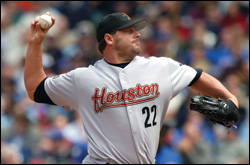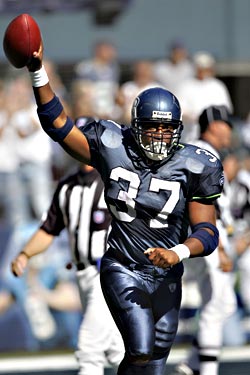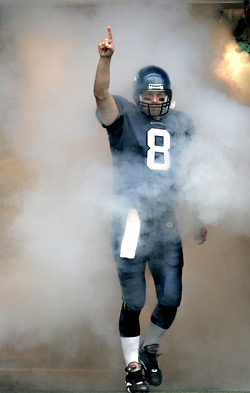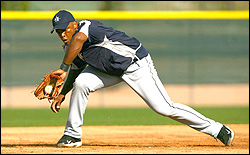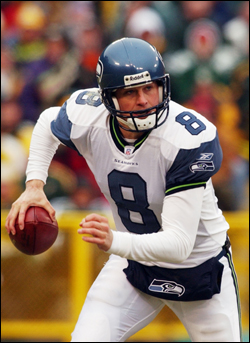With so much buzz about Hall of Fame-bound Roger Clemens throwing for Houston in Seattle this week, you’d have thought locals had forgotten that we’ve seen The Rocket mock us every season since Phil Bradley roamed left field. His 1-zip victory Tuesday, June 8, was his 23rd and probably final triumph (mercifully) over the M’s, but it was just a footnote to a Seattle season long since kicked away. The incessant Rocket talk at least made this much apparent: Many Mariner partisans have stopped thinking about the home guys this season. Visiting stars and other gimmicks might lure bodies past turnstiles through September, but everybody who can count to triple figures knows the M’s by late June might prove to have lost as many games as they did during all of 2001.
“We had more chances than they did,” M’s skipper Bob Melvin said Tuesday night after his losing club followed the pattern of leaving runners in scoring position. Leaving runners on base is the one obvious difference between this and previous versions of the Seattle Mariners. It’s the problem left unaddressed during the off-season.
But Mariner management isn’t satisfied with ruining the 21st century’s winningest big-league ball club in a single off-season. They seem to want to take down the Triple-A Tacoma Rainiers as well. The Mariner front office keeps moving personnel up and down Interstate 5, and the result is that the M’s and poor-cousin R’s both get worse. First, catcher Ben Davis, literally and figuratively, went south; next it was pitcher Gil Meche. All this “help” has barely kept Tacoma above .500, and Rainier fans no doubt expect an eventual losing record should the worst happen and management sends the entire so-called big-league infield their way.
The M’s, meanwhile, have amounted to the soft spot on nearly every competitor’s schedule. Once in a while, there’s a home-team base runner, but it doesn’t matter because Seattle batters wouldn’t hit on a 6-5 blackjack hand. Team announcer Dave Niehaus was begging (in vain, as it happened) to finally describe “that big base hit” midway through a rare victory last Saturday, June 5. “Big” would be, say, a single with two runners in scoring position (Ichiro instead hit a sacrifice fly Saturday), but that’s been as elusive as two-buck gas. Fans, if they can still be called that, have looked at daily lineups more with dread than expectation. A peculiar optimism nevertheless has been articulated, as in, during his recent dead spell: Maybe Bret Boone will only get up four times tonight so he can’t go 0 for five.
In the absence of team-driven interest, it’s surprising management has muffed so many chances at pop-culture-oriented promotions. How about a Stepford Wives night to go along with the release of the flick remake this week? The winner could be the fan most reminiscent of Laura Bush. (Hey, Rush, just joking, bud. We all know sports teams only broach politics when it’s safe: rising from the luxury-suite seats to praise the troops, for example, or braying the jingoistic “God Bless America” during the seventh-inning social-pressure sing-along.)
Another difference between this and recent years is that the “hot-stove league” has warmed up about five months earlier than usual. All you hear is that management can’t wait to trade soon-to-be free agent Freddy Garcia to a real team. You’d think he was the 16-cylinder Escalade the neighbor can’t afford to drive anymore. As I write this, Freddy remains Mariner property, but judging from how the front office “deals,” it wouldn’t be surprising if the team swapped one of the league’s best starters to San Diego for Jeff Cirillo and complimentary admission to SeaWorld.
Field manager Bob Melvin, who looks to have gotten nine hours of sleep since April 6, wearily exchanges yet another rearranged lineup card just about every game. But the runs don’t come. Sunday, June 6, against Chicago, Dave Hansen (“D.H.” in initials and the lineup) doubled (his second) to lead off the sixth, making a team total of five two-baggers with fewer than two out. Total runs: one. That’s damned near impossible. Seeing the futility of the double, Randy Winn jacked perhaps his longest career home run in the seventh to make it 3-2 White Sox, yet the 5-4 victory came not via Niehaus’ “big hit” but from a ninth-inning walk of Jolbert Cabrera.
Even modest RBI production this year might have kept the M’s competitive because, while Seattle has lost personnel (Raul Ibanez, most significantly, and reliever Rafael Soriano), the local carnage has been minimal compared with this season’s elite American League teams. Division nemeses Angels and Athletics seem to lose key players daily, but they maintain commanding leads over the Mariners. But what if the M’s somehow started winning and were only, say, seven back at the All-Star break? Some dare to recall the storied years when Anaheim (2002), New York (1978), and, of course, the M’s (1995) came back from great midseason deficits to make the playoffs. Each of the above, however, had the requisite mix of grizzled vets and spirited young players, most of them overachieving to make something historic happen.
As the Rocket-propelled Astros landed in Seattle this week, it was worth a grim observation that something historic, in fact, could happen here this year: A team that had recently averaged 100 wins could, with much the same personnel, lose 100, which now includes a 23rd time to Clemens.
